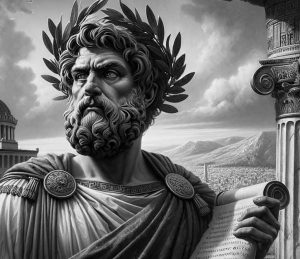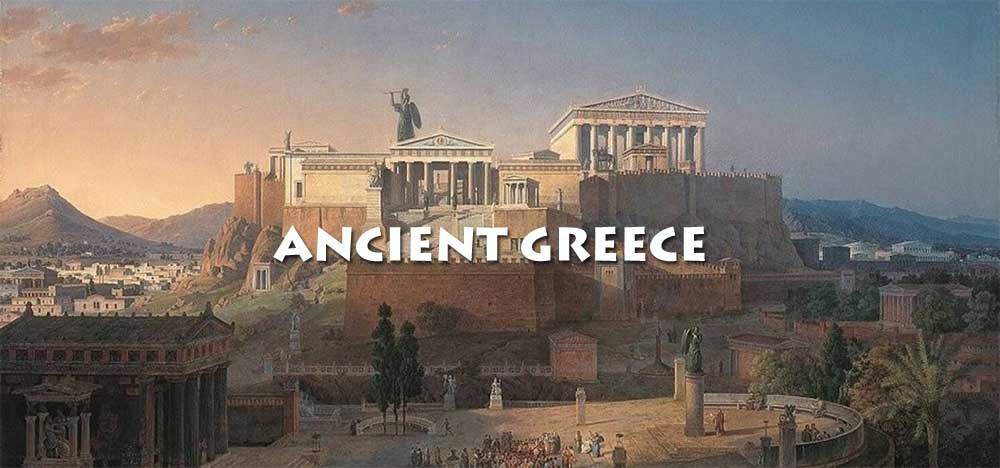Pisistratus Tyrant of Athens
Pisistratus was a significant figure in ancient Greek history, known for his role as a tyrant of Athens in the 6th century BCE. He was not a tyrant in the modern sense of being a cruel and oppressive ruler, but rather a non-hereditary ruler who came to power in an unconventional manner, often through popular support.
 Pisistratus first seized power in Athens in 561 BCE, employing a clever strategy that involved a ruse suggesting he was under divine protection. He was ousted twice but managed to return to power each time, ultimately establishing a stable and prosperous rule until his death in 527 BCE. His rule is often noted for the economic and cultural development of Athens, including the patronage of arts and the establishment of public festivals and buildings that contributed to the city’s glory.
Pisistratus first seized power in Athens in 561 BCE, employing a clever strategy that involved a ruse suggesting he was under divine protection. He was ousted twice but managed to return to power each time, ultimately establishing a stable and prosperous rule until his death in 527 BCE. His rule is often noted for the economic and cultural development of Athens, including the patronage of arts and the establishment of public festivals and buildings that contributed to the city’s glory.
He is also credited with initiating major religious and cultural projects, such as the Panathenaic Festival, which included both athletic competitions and cultural events, celebrating the city’s patron goddess Athena. Moreover, Pisistratus is believed to have contributed to the compilation and standardization of Homer’s epics, the “Iliad” and the “Odyssey,” which were crucial in the development of Greek identity and heritage.
His governance was marked by a mix of shrewd political maneuvers and genuine efforts to improve the city-state’s welfare, including land redistribution and infrastructure projects that benefited the common people. Despite being a tyrant, Pisistratus was relatively mild in his rule compared to other Greek tyrants of the era, focusing on consolidating power through strategic marriages, diplomacy, and military campaigns.
Achievements and Reign as Tyrant of Athens
Pisistratus, the renowned Athenian statesman, left an indelible mark on Ancient Greek history through his remarkable achievements and reign as a tyrant of Athens. During his time in power, Pisistratus implemented various reforms that aimed to benefit the common citizens of Athens. He improved infrastructure by initiating public works projects like the construction of aqueducts and temples.
Known for promoting arts and culture, Pisistratus established the Panathenaic Festival and supported poets such as Homer. Under his rule, Athens experienced a period of prosperity and stability, fostering intellectual growth and artistic development.
Despite facing opposition from rival factions within Athens, Pisistratus managed to consolidate his power through strategic alliances with influential supporters. His leadership style was characterized by a balance of authoritarianism and populism which earned him widespread popularity among the people.
Pisistratus’ reign as tyrant was marked by significant advancements in Athenian society that laid the foundation for future developments in politics, art, and governance.
Controversies and Opposition Faced by Pisistratus
Despite his many achievements, Pisistratus faced his fair share of controversies and opposition during his rule as the tyrant of Athens. Some Athenians viewed him with suspicion due to his rise to power through force and deception. His implementation of reforms that centralized power in his hands also alienated some members of the aristocracy who were used to a more decentralized system.
Pisistratus’ heavy taxation policies and expansion of public works projects led to dissent among the population, with some accusing him of draining the city’s resources for personal gain. Additionally, rumors circulated about his alleged manipulation of religious festivals for political purposes, further tarnishing his reputation among certain segments of society.
Despite these challenges, Pisistratus managed to maintain control through a combination of military strength and political cunning. He skillfully navigated internal rivalries and external threats to solidify his grip on power, demonstrating both resilience and ruthlessness in the face of adversity.
Legacy and Impact on Greece
Pisistratus, a figure of power and intrigue in Ancient Greece, left behind a legacy that reverberated through the annals of history. His impact on Greek politics and society was profound, shaping the course of Athenian governance for generations to come.
As a tyrant of Athens, Pisistratus implemented policies that aimed to benefit the common people, fostering stability and prosperity in the city-state. Despite facing opposition from rival factions, his rule brought about a period of relative peace and cultural advancement.
The reforms introduced during his reign laid the groundwork for democratic principles to take root in Athens later on. Pisistratus’ emphasis on public works projects and cultural patronage also contributed to the flourishing arts scene in ancient Greece.
His legacy serves as a testament to the complexities of power dynamics in early Greek civilization, showcasing both benevolent leadership qualities and authoritarian tendencies. The lasting impact he had on Greek politics underscores his significance as a pivotal figure in shaping the trajectory of Athenian history.
Comparison with other Ancient Greek Rulers
When comparing Pisistratus to other Ancient Greek rulers, it’s essential to consider his unique approach to governance. Unlike some tyrants who ruled with an iron fist, Pisistratus was known for his ability to balance authority with a genuine concern for the well-being of the people.
While figures like Cleisthenes and Pericles are often celebrated for their democratic reforms, Pisistratus’ reign as a tyrant brought stability and prosperity to Athens during a time of political unrest. His focus on infrastructure projects and cultural development set him apart from his contemporaries.
In contrast to the militaristic rule of leaders like Alexander the Great, Pisistratus prioritized education and the arts, leaving a lasting impact on Athenian society. His legacy as a benevolent ruler continues to be studied and admired by historians today.
When examining Ancient Greek rulers, Pisistratus stands out for his innovative policies and commitment to improving the lives of his subjects.
Pisistratus’ lasting influence on Greek politics and society
Pisistratus, the cunning and influential tyrant of Athens, left a lasting mark on Greek politics and society that reverberated long after his reign. His rise to power, achievements as a ruler, controversies faced, and legacy all contributed to shaping the course of Ancient Greek history.
Despite facing opposition from rival factions and enduring challenges to his rule, Pisistratus managed to establish himself as a formidable leader who brought stability and prosperity to Athens during his reign. Through strategic alliances with the common people and advancements in infrastructure such as public works projects, he solidified his hold on power while also improving the lives of Athenian citizens.
Pisistratus’ influence extended beyond his time in office as subsequent rulers looked to him as a model for effective governance. His policies laid the groundwork for future leaders to build upon, setting a precedent for how strong leadership could impact societal development.
In comparison with other Ancient Greek rulers, Pisistratus stood out for his ability to navigate shifting political landscapes and maintain control through both diplomacy and force when necessary. While some may view him as a controversial figure due to his methods of seizing power initially, there is no denying that Pisistratus left an indelible imprint on Greek history.
As we reflect on Pisistratus’ life and legacy, it becomes clear that his contributions have endured through generations, shaping not only the political landscape but also influencing societal norms within Greece. The story of this enigmatic leader serves as a reminder of the complexities inherent in governance and underscores the lasting impact one individual can have on an entire civilization.
